The advisers are a group of distinguished individuals with a close relationship to the Tenure Facility, extending the organisation's networks and competences. They support Tenure Facility's mission and stimulate critical thinking, discussion and learning by sharing their experiences and insights on strategic issues.
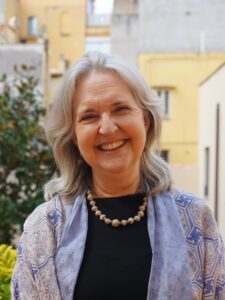
Anne Larson has served as a Principal Scientist at CIFOR (now CIFOR-ICRAF, the Center for International Forestry Research and World Agroforestry) since 2013. She has almost 30 years of international research experience, with more than 20 managing diverse, multicultural, and multidisciplinary global teams for research, engagement, and impact. Anne has a multi-disciplinary background, obtaining her undergraduate degree in Environmental Science from Stanford University, and her PhD in 2001 from U.C. Berkeley in Wildland Resource Science, with an emphasis on resource policy and institutions.
Anne’s work mostly focuses on governance, equity and justice in relation to land and forests, from global policy to national, landscape and local levels. Currently Anne leads CIFOR-ICRAF's research team on Governance, Equity and Wellbeing, oversees gender equity and social inclusion and serves in the organisation’s Management Team. In addition, Anne coordinates fieldwork in more than a dozen countries across Asia, Africa, and Latin America and presently works with projects involving: Indigenous and community forest and land tenure security in landscape restoration; rights and safeguards in climate mitigation initiatives; women’s land and resource rights; transformative land investment for sustainable and just food systems; and multi-stakeholder processes.
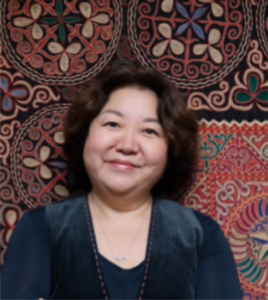
Asyl Undeland is a cultural anthropologist and public sector administration specialist by education. For 25 years, she has worked on inclusion, gender, and governance in land and natural resources management, working in various national and international financial, development, and governmental institutions. Currently, Asyl leads the work on social integrity, inclusion, and gender equality in the Climate Finance Mobilization team of the Climate Change Group at the World Bank. She also manages the Enhancing Access to Benefits while Lowering Emissions (EnABLE) multi-donor trust fund that extends technical assistance, capacity building, and financing to Indigenous Peoples, local communities, and other disadvantaged and vulnerable groups with the aim to enhance their understanding and inclusion in the Bank’s results-based climate finance.
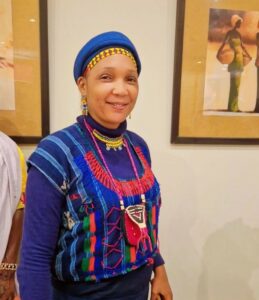
Balkisou Buba is from the Mbororo Fulani Pastoralist community of Cameroon. She is the Founder and President of Indigenous Peoples and Sustainable Development Association (IPSD-Cameroon) and the Vice National Coordinator of the Network for Indigenous Peoples and Local communities for sustainable management of Forest Ecosystems in Central Africa (REPALEAC Cameroon). She has been working for the protection and promotion of the rights of Indigenous Peoples for about 15 years.
She focuses her work on community development, climate change, land rights, biodiversity conservation, traditional knowledge, lobbying and advocacy, empowerment of women. She has been representing Indigenous Peoples nationally, regionally and internationally in different forums, working groups and thematic issues. She is currently one of Africa’s representatives in the Indigenous Peoples Advisory Group (IPAG) of the Green Climate Fund (GCF).
She is a 2015 Mandela Washington Fellow, was trained at the University of Delaware, and carried out her professional development experience in the Phoenix Indian Center in Arizona. She also holds a master’s degree in international Cooperation, Humanitarian Action and Sustainable Development from the International Relations Institute of Cameroon, (IRIC).
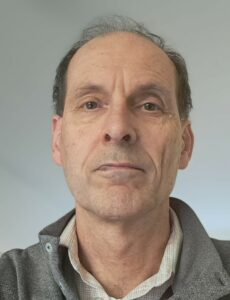
Bas Louman has worked extensively promoting the sustainable management of tropical natural forests in Latin America, seeking greater understanding of the impacts of climate change on forested landscapes. From 2018 onwards, Bas has engaged in linking international climate, biodiversity and finance agreements to locally owned initiatives that recognise the role of trees and forests in increasing the resilience of their landscapes. Currently, Bas serves as a programme coordinator for Tropenbos International, where he promotes the development of inclusive landscape finance in the context of collaborative programmes. With innovative finance structures and instruments, Tropenbos and Bas aim to bridge the gap between the supply of private (international) finance and the needs for finance and income of local farmers and small and medium enterprises.
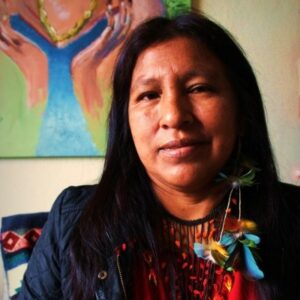
Clemencia Herrera from the Muruimuina de la Chorrera People, is an expert on Indigenous Peoples rights, international cooperation and human rights. She is currently serving as the director of the corporation Mujer, Tejer y Saberes and as the national coordinator of ONIC's School for Indigenous Education, (ONIC is Colombia's national Indigenous organisation). Clemencia has worked extensively promoting Indigenous education processes and training Indigenous leaders. She also founded and developed OPIAC's (the organization of Indigenous Peoples in the Colombian Amazon) School for Indigenous Education. In 2019 she received the Bartolomé de las Casas Award for her ongoing work as a leader and as a recognition of her work promoting and training women leaders.
Clemencia studied Indigenous Peoples’ rights, international cooperation and human rights at the Carlos Tercero University of Madrid in Spain.
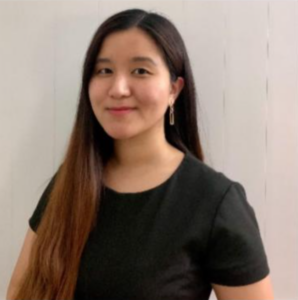
Dawa Yangi Sherpa is a Sherpa-Nepali woman currently based in Lenapehoking, homeland of the Lenape (New York City). Dawa holds a master's degree in environmental policy and a bachelor's degree in biology. Her work emphasises the intersection of land-based cultures, Indigenous knowledge, and the ecological challenges faced by Global South Himalaya communities, particularly in relation to water injustice, climate change, and land grabbing.
Dawa currently serves as the Social Safeguards Technical Specialist with the Rights + Communities Program at the Wildlife Conservation Society where she focuses on the rights of Indigenous Peoples and local communities and on their role in conservation as we face a triple planetary crisis – climate change, pollution, and biodiversity loss. She is an adviser to the Network of Sherpa Students & Professionals board member of United Sherpa Association Inc (2024), and a board member of Greens REALIGN (Redistributing Environmental Authority, Leadership, and Influence to Grassroots).
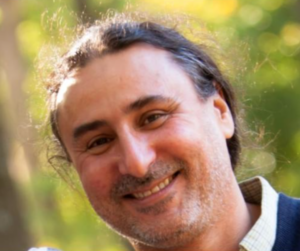
Fergus MacKay is a senior legal counsel at Indigenous Peoples’ Rights International. He previously served as an expert adviser to the Organization of American States concerning its proposed American Declaration on the Rights of Indigenous Peoples and as a member of the advisory panel to the World Bank’s Extractive Industries Review. He has over 30 years of experience supporting Indigenous Peoples in all regions of the world to assert and defend their rights before domestic and international bodies. He has litigated various cases before United Nations treaty bodies, the International Labour Organization, and the Inter-American Commission and Court of Human Rights. This included the cases Saramaka People versus Suriname (2007) and Kaliña and Lokono Peoples versus Suriname (2015). He has authored more than 70 books and articles on the various aspects of the rights of Indigenous Peoples in international law.
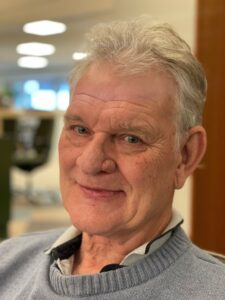
Gunnar Tidström has an extensive professional record of collaboration with international development organisations, advancing development initiatives across multiple countries. Gunnar worked for many years in Brazil for the Swedish NGO Solidaridad Suecia – América Latina and later for Sida, the Swedish International Development Cooperation Agency, where he served as a controller, programme officer, and later as country programme coordinator. Throughout his professional career, Gunnar has gained important experience and knowledge through living in various countries and working with diverse communities in Peru, Burkina Faso, and Mozambique. In 2022, Gunnar worked as a financial consultant for Tenure Facility where he gained insights into the organisation’s mission, purpose and work.
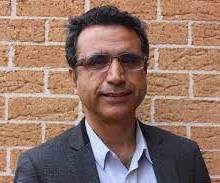
Hemant Ojha is an environmental social scientist working to strengthen community rights, climate justice, locally led development, and climate adaptive livelihoods across Asia, the Pacific, and to some extent, Africa. He is an Adjunct Professor at the University of Canberra and an Associate Professor at the Australian National University. He also serves as the Principal Advisor for the Institute for Study and Development Worldwide (IFSD), Sydney. He has worked intensively in Himalayan South Asia as an action researcher and policy analyst, collaborating closely with community movements and policymakers in community-based natural resources management, water policy, inclusive development, and climate change adaptation. He has co-founded civil society research organisations and Think Tanks for critical action research and influencing environmental policy in South Asia. He has advised several international agencies, including UNESCO and the OECD, and contributed to various international panels on environment and development. He has published over 200 research papers, and his current research focuses on climate adaptation, losses and damages, community resilience, and participatory environmental governance. He is advancing a policy lab method for tackling the knowledge-power nexus in natural resources management and climate change adaptation.
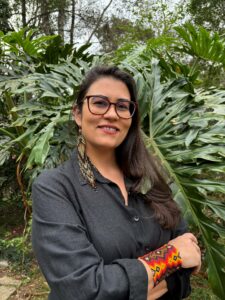
Inimá Lacerda (Inimá Krenak), an Indigenous woman from the Krenak People, is a social scientist by training and an environmental manager with more than 20 years of experience working in projects and partnerships with traditional communities. Inimá has extensive experience in fostering collaborations with companies, government agencies, and international donors focused on the promotion of traditional knowledge, indigenous rights, environmental protection, and climate change mitigation.
Since 2019, Inimá has worked as a Programme Manager at the Casa Socioenvironmental Fund where she is responsible for implementing donation policies and strategies in support of Indigenous organisations in Brazil. Throughout her career, Inimá has developed an impactful leadership trajectory dedicated to advancing Indigenous rights and cultural preservation. She currently serves as a member of the Council of the Indigenous Culture Center, and previously held a position on the board of directors at Institute of Indigenous Traditions, where she served for eight years.
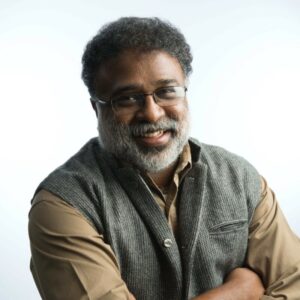
Jagdeesh Puppala has an extensive professional record working with interrelated issues such as poverty, environmental degradation, and ‘systems thinking’ at the interface of ecology, society and economy. From 2001 to 2020, Jagdeesh served as Chief Executive of the Foundation for Ecological Security. Subsequently, he curated the initiative “Promise of Commons” since its inception until 2021. In 2022, he worked as an entrepreneur-in-residence at Omidyar Network India.
Currently, Jagdeesh anchors the ecosystem initiative 'Common Ground', which aims to build collaborative actions to address climate change, economic opportunity losses, and inequality challenges. He also serves as the CEO of Living Landscapes, set up as a backbone organisation to serve the Common Ground initiative.
Jagdeesh’s work and impact has been internationally recognised. In 2015, he received the ‘Skoll Award for Social Entrepreneurship, in 2017 he was recognised as a Henry Arnhold (Mulago) Conservation Fellow and in 2022 as Senior Ashoka Fellow.

Josimara Baré is an Indigenous woman of the Baré People, originally from the Cue Cue Marabitana Indigenous Land, located in the Upper Rio Negro, Northwest Amazon. Josimara is a young leader and activist in the Brazilian Indigenous Movement. She has experience working with Indigenous funds, and thus, has a strong presence and impact in the direct financing agenda for Indigenous Peoples. Josimara dedicates her work and life to defend the self-determination of Indigenous Peoples, promote sustainable development and the preservation of territories.
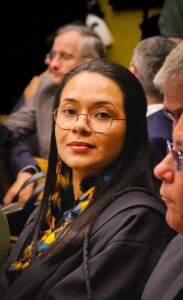
Kari Guajajara is a Guajajara Indigenous woman self-described as Tentehar, from the Ypaw My`ym Village of the Araribóia Indigenous Land in Brazil. Kari is a lawyer by profession who has extensive experience in the public service sector, in the defence of human rights and those of Indigenous Peoples. Kari served as Deputy Secretary of State for Women in Maranhão and worked as a parliamentary adviser to Brazil's first Indigenous member of parliament, Joenia Wapichana.
Currently Kari is a member of the Observatory for the Human Rights of Isolated and Recently Contacted Indigenous Peoples, and Director of Strategic Partnerships at the AmazoniAlerta Institute. She also works as a lawyer specialising in Indigenous rights within the frameworks of the Coordination of Indigenous Organisations of the Brazilian Amazon and the Coordination of Organisations and Articulations of Indigenous Peoples of Maranhão.
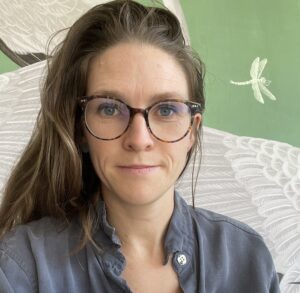
Oda Almås Smith has more than 10 years of experience working in solidarity with Indigenous and forest Peoples in tropical countries, with particular focus in Guyana and Panama. She currently works as a programme coordinator for the Responsible Finance Programme at the organization Forest Peoples Programme. Within her role, she oversees the programme’s work portfolio across South America, Africa and Southeast Asia. The Responsible Finance Programme Odå coordinates aims to accompany Indigenous and forest Peoples defend their lands and associated rights from external threats, extractive industries, infrastructure projects, and organized crime, which enter their territories without consent.
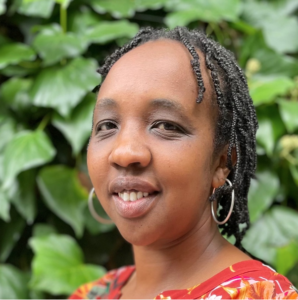
Paine Eulalia Mako serves as the executive director at the Ujamaa Community Resource Team (UCRT), where she has over a decade of experience. Her journey within UCRT began as a field facilitator, later evolving into a leadership role as the gender program coordinator. In this capacity, she established women rights and leadership forums, where she advocated for women’s rights and leadership.
Paine plays a pivotal role in building partnerships and mobilizing resources for UCRT's mission. She has represented East Africa on the International Land Coalition’s Global Council and has served on various boards.
Prior to joining UCRT, Paine worked with AMREF Kenya and the Street Families Rehabilitation Trust Fund in Nairobi, focusing on youth development and community rehabilitation. She holds a master’s degree in climate change and sustainable development and has experience in organisational management, financial oversight, and strategic leadership.
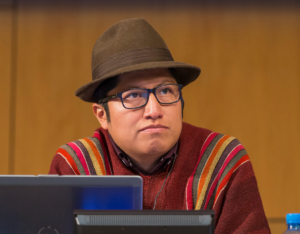
Q’apaj Conde Choque is the associate programme management officer in the Peoples and Biodiversity Unit at the Secretariat of the Convention on Biological Diversity. He previously served as an Indigenous fellow at the World Intellectual Property Organization (2013–2014) and as legal officer at the Centro de Estudios Multidisciplinarios-Aymara (2016–2017). As a member of the Red de Jóvenes Indígenas–LAC, he also served as co-chair of the Global Indigenous Youth Caucus (2017–2018).
Q’apaj holds a law degree from the Universidad Mayor de San Andrés, a Master of Laws from the University of Seville, and a Doctorate of Juridical Sciences from the Indigenous Peoples Law and Policy Program at the University of Arizona.
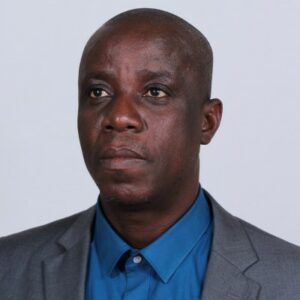
Silas Kpanan’Ayoung Siakor is a development expert who has more than 20 years of experience working on natural resources, advancing community rights through advocacy and promoting policy and law reform in Liberia. Since 2020 he has served as Country Manager for the Sustainable Trade Initiative also known as IDH, an international organisation with its head office in the Netherlands. Silas’ main areas of interest include effective land governance, forest and agricultural management, civil society capacity building, facilitating and strengthening community-based natural resource governance, and supporting communities to organise, defend, and champion their rights.
Silas’ work and impact has been internationally noted. In 2002, he was recognised with the Whitley Award for Human Rights and the Environment, in 2006, he was awarded the Goldman Environmental Prize, in 2012 the Alexander Soros Award for Extraordinary Achievement in Environmental and Human Rights Activism and in 2019, he received the Mundo Negro Award for his work in Liberia.
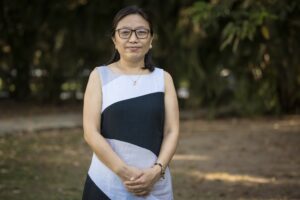
Sushila Kumari Thapa Magar belongs to the Magar Indigenous Peoples of Nepal. She is academically trained as a forester and holds an MSc in Mountain Forestry from the University of Vienna. Sushila Kumari has two decades of experience in the development sector where she has worked with different national and international non-governmental and bilateral organisations. Her areas of expertise encompass participatory natural resource management, economic empowerment, good governance, human rights, gender equality, social inclusion, and Indigenous-led fund management. Sushila Kumari is actively engaged with regional and global women and Indigenous movements as she is committed to foster and strengthen the leadership, technical, and organisational capacity of women, Indigenous Peoples, and marginalised communities to help amplify voices and promote solidarity.
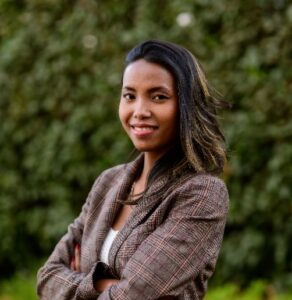
Vatosoa Rakotondrazafy is a dedicated advocate for ocean conservation and community empowerment. She focuses on promoting sustainable marine management while amplifying the voices of small-scale fishers. She played a pivotal role in advancing Locally Managed Marine Areas (LMMAs) across Madagascar.
Currently, Vatosoa serves as IUCN's Regional Coastal and Ocean Governance Manager, where she works to strengthen equitable governance systems in marine conservation. She is also recognized as IUCN's Champion for Indigenous Peoples and Local Communities (IPLCs), advocating for their rights and inclusion in conservation initiatives.
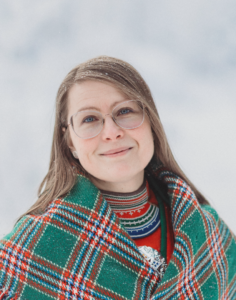
Åsa Larsson Blind, is a member of a Saami reindeer-herding family. She has long experience in working with Saami and Indigenous issues both in Sweden and internationally. She has been a member of the Saami Council since 2008, serving as Vice Chair from 2011 to 2017 and 2021 to 2024, and as President from 2017 to 2019. Additionally, Åsa served as chair of the Saami national association in Sweden (SSR) from 2019 to 2021. She was the first woman to have held that position.
Åsa holds a MSc in Human Resources Management and Development from Umeå University. She has dedicated an extensive part of her professional career working in project manager roles for Saami-led projects as well as developing project ideas, fundraising processes, and implementing projects.
Åsa is also a municipality politician. In 2018, she was elected to the municipality council in Kiruna, representing Sámelistu, a local Saami party. In 2022, she was re-elected and currently serves as member in the municipality council, municipality board, and chair of the minority language committee.
Åsa also served in the board of the Arctic Council Indigenous Peoples Secretariat and as the Head of Delegation for Saami Council at Arctic Council Senior Arctic Official meetings; the board of Saami national association in Sweden (SSR), the board of the Saami Educational Centre in Jokkmokk, and the board of Sáminuorra, the Saami Youth organisation in Sweden.